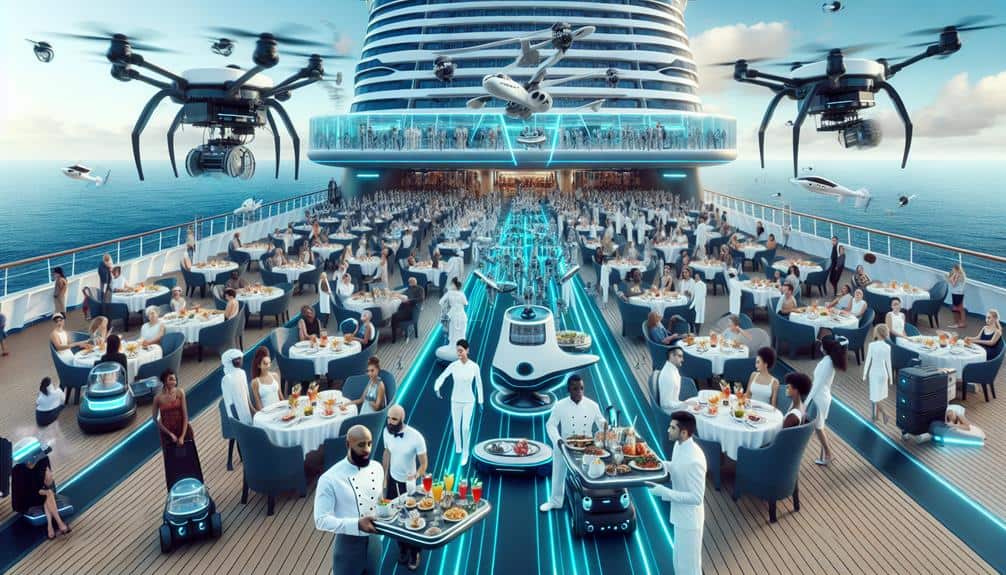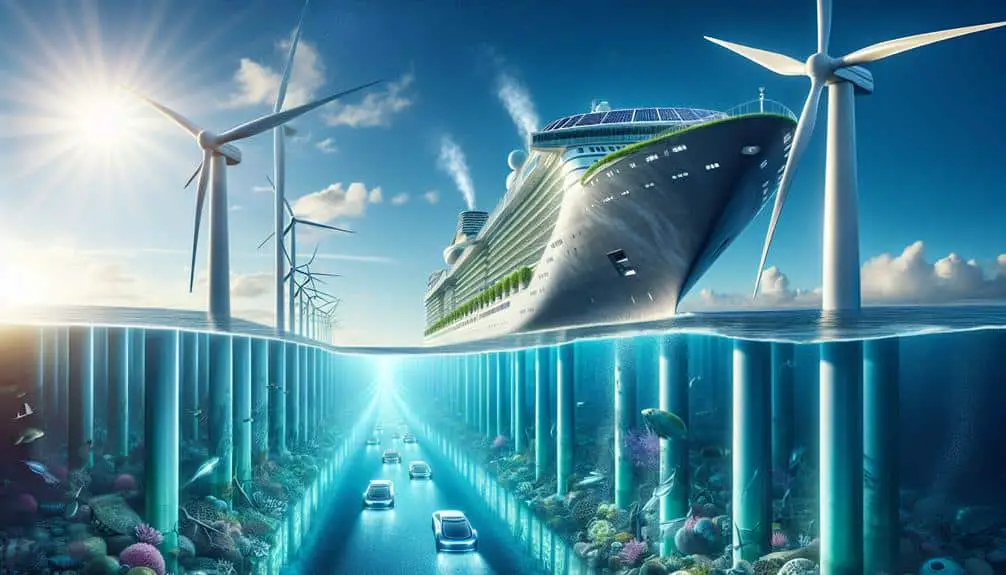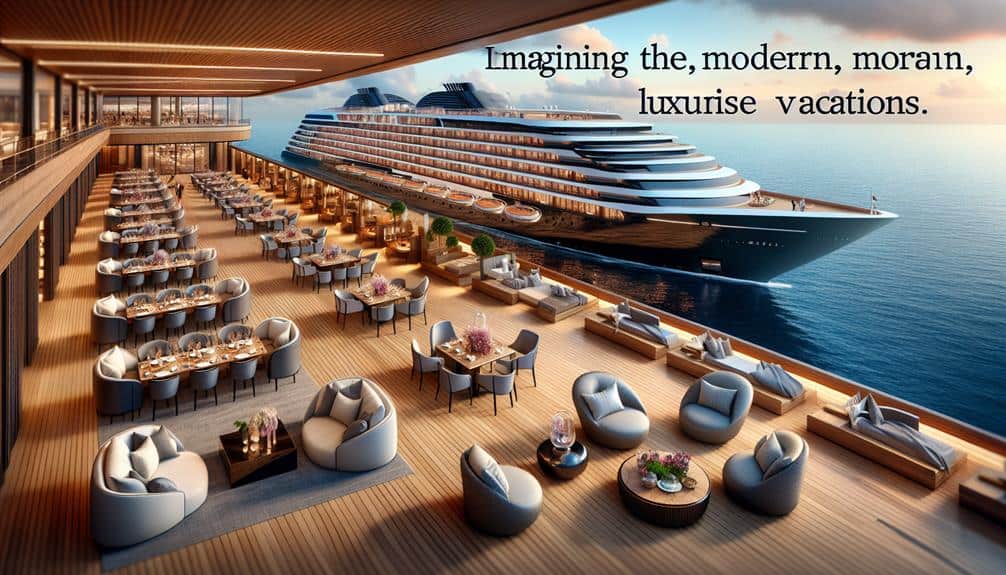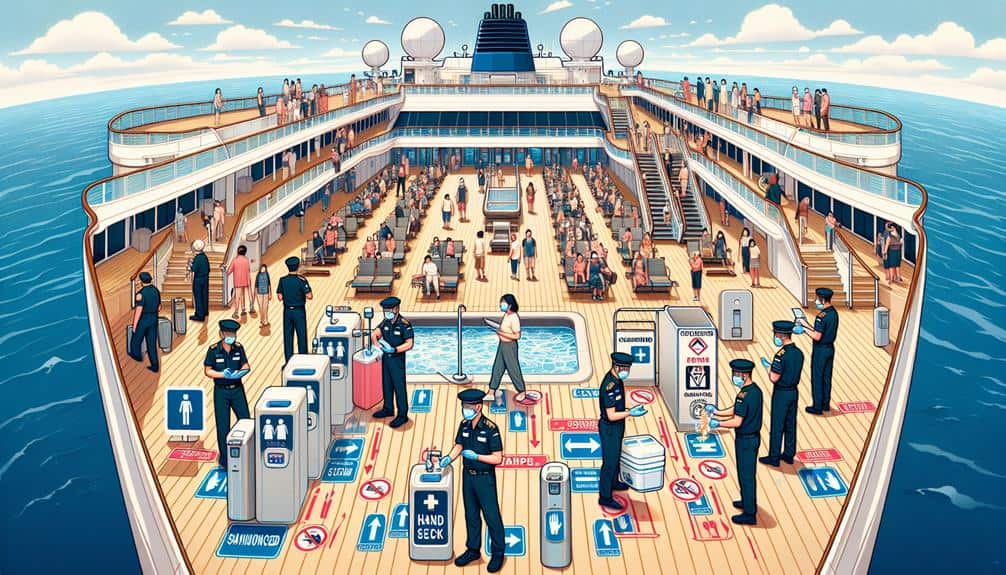Technology is revolutionizing the cruise ship industry by enhancing guest experiences with personalized interactions and AI integration. Operations are more efficient through technology-driven solutions like advanced software and real-time monitoring. Sustainability initiatives implement eco-friendly practices and promote a circular economy. Personalized services cater to individual preferences through tailored offerings and data analytics. Safety and security upgrades include enhanced surveillance and communication systems. These advancements collectively elevate the industry to new heights.
Key Points
- Personalized interactions and AI integration enhance guest experiences.
- Technology-driven solutions streamline operational processes.
- Sustainability initiatives integrate eco-friendly practices.
- Personalized services cater to individual preferences.
- Safety and security upgrades enhance monitoring and emergency response.
Enhanced Guest Experience
Enhancing guest satisfaction through personalized interactions is a pivotal aspect of the technological advancements in the cruise ship industry. AI integration and digital innovations play a critical role in creating tailored experiences for passengers. By leveraging AI, cruise lines can analyze guest preferences, behaviors, and feedback to offer personalized services. For instance, AI-powered chatbots can provide real-time assistance, recommend activities based on individual preferences, and handle booking inquiries promptly.
Moreover, digital innovations such as smart room keys and wearable technology enhance the guest experience by streamlining processes and providing convenience. Guests can use their smart devices to access their rooms, make onboard purchases, and receive personalized recommendations. This level of connectivity and ease of access elevates the overall cruise experience, making it more seamless and enjoyable for passengers.
Efficiency in Operations
Efficiency in operations within the cruise ship industry is paramount for maximizing productivity and ensuring smooth sailing throughout various onboard processes. By implementing technology-driven solutions, cruise lines can streamline processes, leading to significant cost savings and improved overall performance. For instance, the utilization of advanced software for inventory management allows for better control over supplies, reducing waste and optimizing resource allocation.
Real-time monitoring systems help track fuel consumption, enabling captains to make data-informed decisions that enhance fuel efficiency and cut operational expenses.
Moreover, the integration of automated maintenance schedules powered by predictive analytics minimizes downtime by preemptively addressing potential issues before they escalate, ensuring that the ship operates at peak performance levels. These data-driven approaches not only enhance operational efficiency but also contribute to a more sustainable operation by reducing unnecessary resource consumption.
As the cruise ship industry continues to embrace technological advancements, the focus on efficiency in operations remains a cornerstone for achieving success in a competitive market landscape.
Sustainability Initiatives
Implementing sustainability initiatives within the cruise ship industry involves integrating eco-friendly practices that minimize environmental impact while enhancing operational efficiency. Cruise lines are increasingly turning to renewable energy sources like solar and wind power to reduce their carbon footprint. By harnessing these clean energy alternatives, cruise ships can lower their reliance on traditional fuels, leading to decreased emissions and overall environmental impact.
Furthermore, waste management plays a pivotal role in sustainability efforts within the industry. Cruise ships are implementing advanced waste sorting systems to guarantee proper disposal and recycling of materials onboard. This not only minimizes the amount of waste ending up in landfills but also promotes a circular economy by repurposing materials whenever possible.
Personalized Services
Personalized services in the cruise ship industry cater to individual preferences and elevate the overall guest experience through tailored offerings and exclusive amenities. Customized offerings and tailored experiences have become essential components for cruise lines looking to differentiate themselves in a competitive market. By leveraging technology, cruise companies can collect data on guest preferences, behaviors, and past experiences to create personalized experiences that cater to each guest's unique needs.
Through the use of artificial intelligence and data analytics, cruise ships can offer personalized recommendations for onboard activities, dining options, and excursions that align with each guest's interests. For instance, a guest who enjoys adventurous activities may receive suggestions for shore excursions like zip-lining or snorkeling, while a guest looking for relaxation may be recommended spa treatments or yoga classes.
These tailored experiences not only enhance guest satisfaction but also drive increased onboard spending as guests are more likely to engage with and pay for services that align with their preferences. As cruise lines continue to invest in personalization technologies, the future of cruising is set to offer even more bespoke experiences for travelers seeking a unique and tailored vacation.
Safety and Security Upgrades
To guarantee the continued safety and security of guests onboard cruise ships, advancements in technology have prompted significant upgrades in surveillance systems and emergency response protocols. The implementation of advanced surveillance technologies, such as high-definition cameras and sensors, has greatly enhanced monitoring capabilities across different areas of the ship. These systems not only help in deterring potential security threats but also aid in quickly identifying and addressing any safety concerns that may arise.
Moreover, cruise lines have revamped their emergency response protocols by integrating real-time communication tools and location tracking devices. In the event of an emergency, these upgrades enable crew members to respond promptly and efficiently, ensuring the well-being of all passengers on board. By leveraging technology to improve safety and security measures, cruise ships can offer passengers peace of mind while maintaining a high standard of service excellence.
As the cruise ship industry continues to evolve, investing in cutting-edge surveillance and emergency response solutions remains paramount to safeguarding the overall cruise experience.
Frequently Asked Questions
How Do Cruise Ships Handle Medical Emergencies at Sea?
In the event of a medical emergency at sea, cruise ships swiftly respond with well-equipped medical facilities and trained staff. Advanced technology aids in communication with onshore medical experts for timely assistance and care.
What Measures Are in Place to Prevent Cyber Attacks on Cruise Ship Systems?
To prevent cyber attacks on cruise ship systems, strong cyber security measures are essential. Implement data encryption, firewalls, and provide extensive training to staff. These proactive strategies safeguard sensitive information and guarantee smooth operations at sea.
How Are Cruise Ships Incorporating Artificial Intelligence and Machine Learning Technologies?
You can see how cruise ships are leveraging AI algorithms and machine learning for predictive maintenance. These technologies analyze data to anticipate maintenance needs, enhancing efficiency and passenger safety while reducing downtime and costs.
Are There Any Regulations in Place to Ensure the Safety of Passengers and Crew During Extreme Weather Conditions?
To guarantee safety during extreme weather, cruise ships adhere to strict emergency protocols and safety guidelines. Crew training emphasizes weather preparedness, enabling swift responses. These regulations prioritize passenger and crew well-being in challenging conditions.
How Do Cruise Ships Manage Waste Disposal and Recycling on Board?
To effectively manage waste disposal and recycling on board, cruise ships integrate advanced technologies for energy efficiency and waste management. By implementing innovative solutions, such as waste-to-energy systems and recycling programs, ships optimize sustainability practices.




